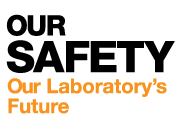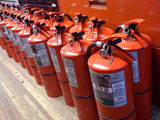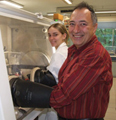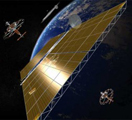



Those who perform or manage work involving welding, torches, grinding and similar operations that might start a fire, must obtain a permit before commencing that type of work. Go here to review the rewritten Section 12.6 of Publication 3000, and here to view the appendix, which includes additional details.
Go to OurSafety for more on the Lab's safety efforts.
 The French Minister of Research and Higher Education, Valérie Pécresse, visited Berkeley Lab last Thursday as part of a tour of Bay Area research and education institutions. Several Lab scientists briefed her, including Associate Laboratory Director for General Sciences Jim Siegrist, who provided an overview of the Lab, and Heinz Frei, Deputy Director of the Helios Solar Energy Research Center, who discussed the Lab's effort to develop fuels from sunlight. She also toured the Molecular Foundry, the National Center for Electron Microscopy (NCEM), and the Joint BioEnergy Energy Institute. Her two-day visit also included stops at UC Berkeley and Stanford University. Pécresse is pictured above with NCEM's Uli Dahmen.
The French Minister of Research and Higher Education, Valérie Pécresse, visited Berkeley Lab last Thursday as part of a tour of Bay Area research and education institutions. Several Lab scientists briefed her, including Associate Laboratory Director for General Sciences Jim Siegrist, who provided an overview of the Lab, and Heinz Frei, Deputy Director of the Helios Solar Energy Research Center, who discussed the Lab's effort to develop fuels from sunlight. She also toured the Molecular Foundry, the National Center for Electron Microscopy (NCEM), and the Joint BioEnergy Energy Institute. Her two-day visit also included stops at UC Berkeley and Stanford University. Pécresse is pictured above with NCEM's Uli Dahmen.
 Berkeley Lab materials scientist Matthew Francis recently received a Distinguished Teaching Award from UC Berkeley. Matthew, an associate professor of chemistry since 2001, was selected based on feedback from his students and peers, who lauded his exceptional skills. "It is critically important that we show students how much fun we are having, how much we love the science that we study, and that we are (or at least were!) very much like them," says Francis of his teaching philosophy. He previously won two Departmental Teaching Awards and the College of Chemistry’s Noyce Prize for Excellence in Undergraduate Teaching.
Berkeley Lab materials scientist Matthew Francis recently received a Distinguished Teaching Award from UC Berkeley. Matthew, an associate professor of chemistry since 2001, was selected based on feedback from his students and peers, who lauded his exceptional skills. "It is critically important that we show students how much fun we are having, how much we love the science that we study, and that we are (or at least were!) very much like them," says Francis of his teaching philosophy. He previously won two Departmental Teaching Awards and the College of Chemistry’s Noyce Prize for Excellence in Undergraduate Teaching.
 Special Event: ESD’s Distinguished Scientist Seminar on Friday
Special Event: ESD’s Distinguished Scientist Seminar on FridayThe Earth Sciences Division will host the next installment of its Distinguished Scientist Seminar series on Friday, April 24, at 10:30 a.m. in the Building 66 Auditorium. The speaker will be Laurent Charlet, of the Université Joseph Fourier in Grenoble, France. Charlet is an expert in contaminant geochemistry, particularly with respect to arsenic and selenium.
 World of Science: U.S. Company to Tap Solar Energy in Space
World of Science: U.S. Company to Tap Solar Energy in Space[The Guardian] A leading American power company is hoping to turn science fiction into reality by supporting a project to set up solar panels in outer space and beam the electricity generated back to Earth. The firm, Solaren Corp, says it will launch solar panels into orbit and then convert the power generated into radio-frequency transmissions, which will be beamed back down into a depot in Fresno, California. The energy would then be converted into electricity and fed into the regular power grid. More>
A part of Lawrence Road near the Molecular Foundry will be limited to one lane from 11 a.m. to noon on today. Flaggers will direct traffic. Drivers are urged to use caution when traveling in this area.
Today at Berkeley Lab is produced by Public Affairs' Communications Department